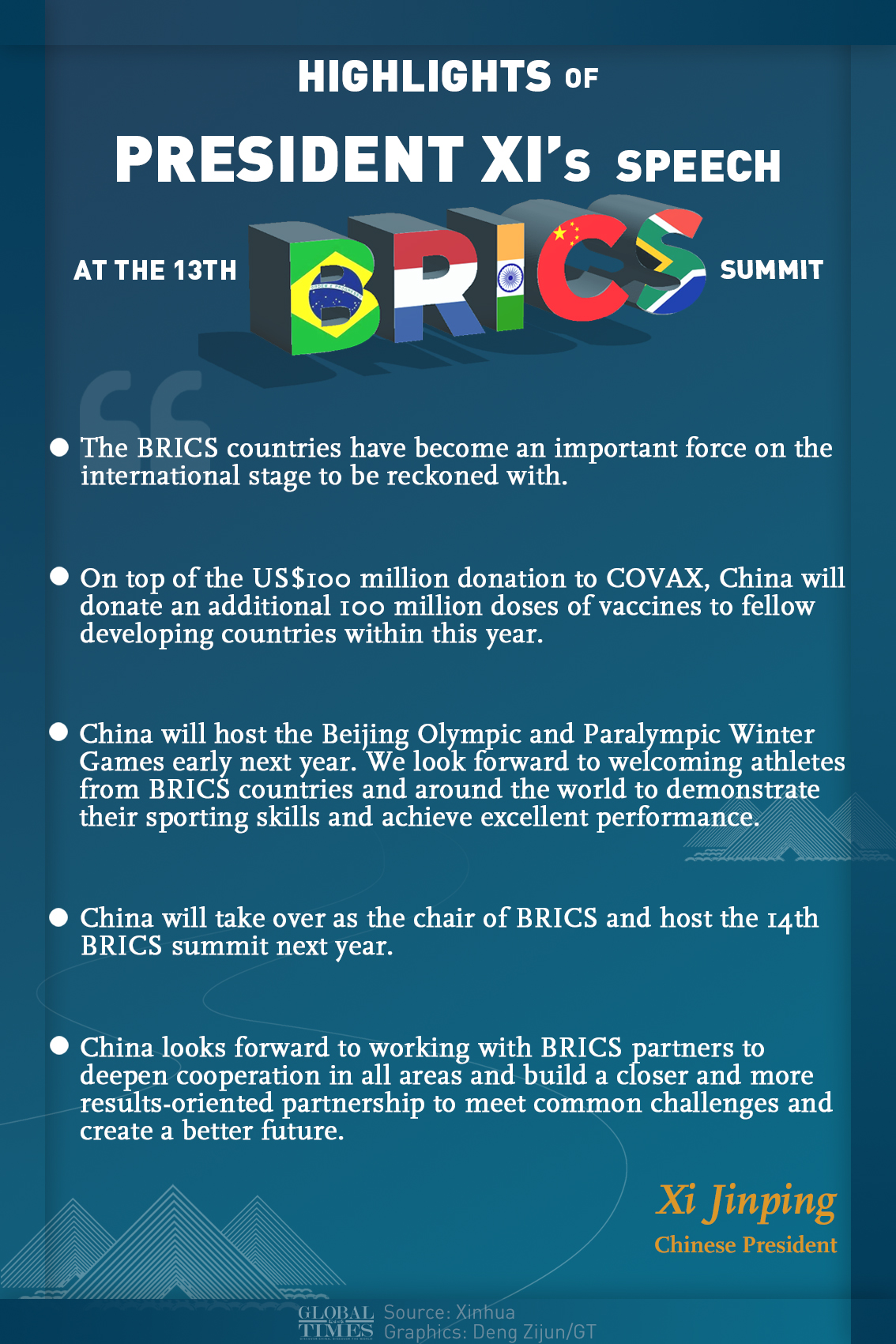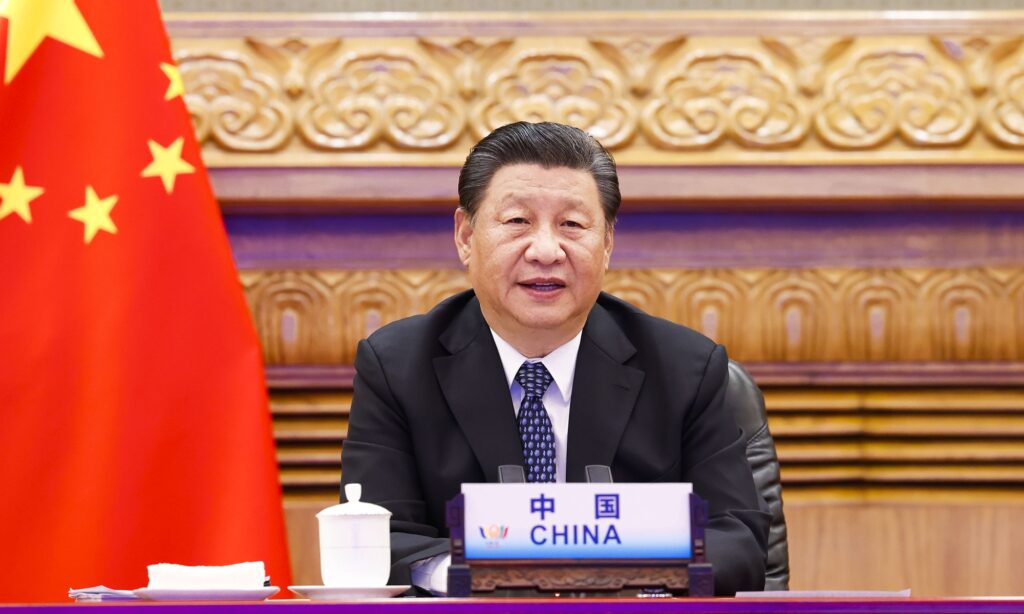The BRICS countries have become an important world power to be reckoned with, and facts have already proven that no matter what difficulties emerge, as long as BRICS remain united and make joint efforts, cooperation will be smooth, solid and sustained, Chinese President Xi Jinping said.
Xi made the remarks when he attended the 13th BRICS summit via video link on Thursday.
China will chair the BRICS Summit in 2022, and looks forward to deepening cooperation in various fields with its BRICS partners to build a closer, more pragmatic partnership, and to jointly tackle common challenges, Xi said at the summit.
Leaders of the five BRICS countries – China, Russia, Brazil, South Africa and India – met virtually on Thursday for talks chaired by Indian Prime Minister Narendra Modi.
The summit is being held amid the global fight against the COVID-19 pandemic, and countries around the world are also making efforts to bring about economic reconstruction. Meanwhile, the situation in Afghanistan poses specific security concerns, with three member states sharing regional interests and China also sharing a border with the country.
Chinese experts said that the major powers in BRICS share similar points on the hot spot issue of Afghanistan, but due to their different national interests and standards on counter-terrorism, it will be hard to see effective and deep cooperation on the matter. What BRICS countries can do is boost economic recovery and build mutual trust in fighting the COVID-19 pandemic, which are the priorities shared by the five major economies, and put their differences over other issues aside.
“To date, China has provided more than 1 billion doses of finished and bulk vaccines to over 100 countries and international organizations, and will strive to provide a total of 2 billion doses by the end of this year,” Xi said.
Xi announced that on top of the US$100 million donation to COVAX, China will donate an additional 100 million doses of vaccines to fellow developing countries within this year.
Russian President Vladimir Putin said at the summit via video link that the withdrawal of the US and its allies from Afghanistan has led to a new crisis, and it is “still unclear how it will affect regional and global security,” according to Indian media NDTV.
“Global security has faced serious challenges and the system of strategic stability has gone down. Our countries have paid special attention to this issue [Afghanistan]. Russia and its BRICS partners have consistently spoken for establishing long-awaited peace and stability on Afghan soil,” Putin noted.
Afghanistan should not become a “threat to its neighboring countries, a source of drug trafficking and terrorism,” Modi also said in his address to the virtual summit, NDTV reported.
After the summit, the five countries have made the BRICS New Delhi Declaration. In the part related to Afghanistan, the declaration said, “We call for refraining from violence and settling the situation by peaceful means. We stress the need to contribute to fostering an inclusive intra-Afghan dialogue so as to ensure stability, civil peace, law and order in the country.”
“We condemn in the strongest terms the terrorist attacks near the Hamid Karzai Kabul International Airport that resulted in a large number of deaths and injuries. We underscore the priority of fighting terrorism, including preventing attempts by terrorist organizations to use Afghan territory as terrorist sanctuary and to carry out attacks against other countries, as well as drug trade within Afghanistan. We emphasize the need to address the humanitarian situation and to uphold human rights, including those of women, children and minorities,” reads the New Delhi Declaration.
China announced a significant move to provide emergency humanitarian aid including food, materials for winter, medicines and 3 million doses of COVID-19 vaccines to Afghanistan on Wednesday, just one day after the Taliban announced the establishment of its interim government.
Qiu Wenping, an expert on Afghanistan at Fudan University, said Afghanistan is a significant country in the China-proposed Belt and Road Initiative, so providing emergency aid to the country when it faces serious sanctions from the West and desperately needs external help will win appreciation from not only the Taliban but also the people of Afghanistan. “It’s just like offering coal in snowy weather,” Qiu said, quoting an old Chinese saying.
The Taliban need to realize absolute control of the country as soon as possible and to restore stability, and after receiving China’s humanitarian aid, the organization will owe China a big favor, and in the next step, the Taliban will have to make efforts to respond to China’s demand to strike the ETIM, said some Chinese analysts.
China has made the first move, and in the future, possibly after the Shanghai Cooperation Organization summit scheduled to be held on September 17, more countries will follow China’s steps in providing assistance to Afghanistan to ensure that the local people avoid a humanitarian crisis this winter, said some analysts.

Highlights of President Xi’s speech at the 13th BRICS summit. Graphic: GT
Who are key players?
China and Russia share a similar stance on the Afghan issue, while India leans more toward the US, Lin Minwang, a professor at the Institute of International Studies at Fudan University, told the Global Times on Thursday.
Although on the surface major powers worldwide share similar stances on Afghanistan, such as the need to restore peace and stability and to prevent the country from becoming a haven for terrorists again, they have different standards on identifying terrorist groups, so it’s hard for them to have effective counter-terrorism cooperation, as they can only cooperate with the partners who have a similar stance and common interests, said experts.
Due to the Taliban’s victory, India is facing a very embarrassing situation as it has always held a hostile stance toward them, and now has very limited influence in the country, so New Delhi is desperately seeking new ways to keep involved, said Chinese analysts.
The Haqqani network, an extremist armed group under the Taliban which is also designated as a terrorist organization by the US, treats India as its enemy. Since Sarajuddin Haqqani, son of the founder of the Haqqani network, has been announced as the acting interior minister, India is becoming increasingly concerned over the situation, Lin said.
Russia shares some similar concerns with India, as the Taliban is on its list of terrorist groups, and after the pllout of US troops from Afghanistan, Russia’s stance is also becoming more flexible now, but it’s still less active compared to that of China, Lin noted.
China and Russia, together with Turkey, Iran and Pakistan, were invited by the Taliban to the ceremony announcing the composition of the new government, but India was not, which shows that New Delhi does not play a central role on the issue, said experts.
Chinese President Xi Jinping addresses the 13th BRICS Summit on Thursday via video link in Beijing. Photo: Xinhua


